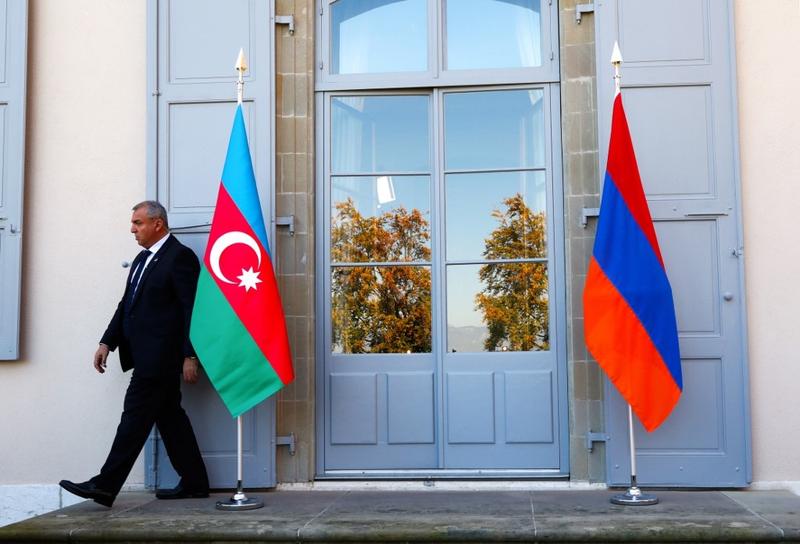 In this Oct 16, 2017 photo, a security guard walks past an Azerbaijan (left) and Armenian flag at the opening of talks in Geneva. (DENIS BALIBOUSE / POOL / AFP)
In this Oct 16, 2017 photo, a security guard walks past an Azerbaijan (left) and Armenian flag at the opening of talks in Geneva. (DENIS BALIBOUSE / POOL / AFP)
Deadly weekend border clashes between Azerbaijani and Armenian forces spilled over into Monday, with more artillery fire and accusations from each side of provocations that have sustained the fighting.
Armenia and Azerbaijan have been "sworn enemies" since gaining independence in the 1990s, Russia's RT TV channel said in a commentary
The two neighbors have long been in conflict over the disputed region of Nagorno-Karabakh, although the latest clashes occurred some 300 kilometers from the mountainous enclave, Reuters said.
On Monday, the Armenian Defense Ministry said Azerbaijani troops had renewed the shelling of Armenian positions on the border, while Azerbaijan reported that the skirmishes that began at the weekend had killed four of its soldiers.
The ministry said the Azerbaijani military had "resumed its provocative actions after two to three hours of a pause" in the fighting between the Caucasus arch-rivals on Sunday, and continued to hit targets in its province of Tavush on Monday morning.
ALSO READ: Ruling party retains majority in Azerbaijan's parliament
"The Armenian armed forces gave an adequate response. It cannot be ruled out that the number of the losses suffered by our opponent will increase," a ministry spokeswoman wrote on Facebook.
Earlier, Azerbaijan's Defense Ministry had announced the deaths of two of its soldiers on Sunday night. In an update, the ministry said that aside from the three Azerbaijani soldiers killed in the Sunday clashes, four others were wounded.
The renewed shelling on Monday has heightened fears of an intensified escalation between the two South Caucasus countries.
A conflict over Nagorno-Karabakh broke out in 1988 after the highland region declared independence from the then Azerbaijani Soviet Republic.
Armenia and Azerbaijan have been "sworn enemies" since gaining independence in the 1990s, Russia's RT TV channel said in a commentary on the latest round of fighting.
Before the weekend, the last major flare-up between the two countries occurred in April 2016, when they fought for four days and deployed heavy weapons. The battles claimed the lives of more than 90 troops across both sides.
On Monday, the Azerbaijani Defense Ministry accused the Armenians of violating a cease-fire, agreed in 1994, on 70 occasions with large-caliber machine guns over the previous 24 hours.
"The attack by the Armenian side, with the use of artillery ... constitutes aggression, an act of the use of force, and another provocation," said Hikmet Hajiyev, foreign policy chief for Azerbaijan's President Ilhan Aliyev.
READ MORE: Azerbaijan's Aliyev wins 7-year term on top of 15 served
He claimed that Armenia launched the "offensive and a provocation during the time when the international community is fighting the COVID-19 pandemic".
The Armenian Defense Ministry counters that the flare-up started after Azerbaijani soldiers had tried to cross the border in a vehicle.
Labeling them trespassers, the ministry said the Azerbaijanis were forced to abandon their vehicle and flee. Soon afterward, the Azerbaijani forces launched a cross-border attack, the Armenians said. The statement said no Armenian soldiers have been hurt in the clashes.


